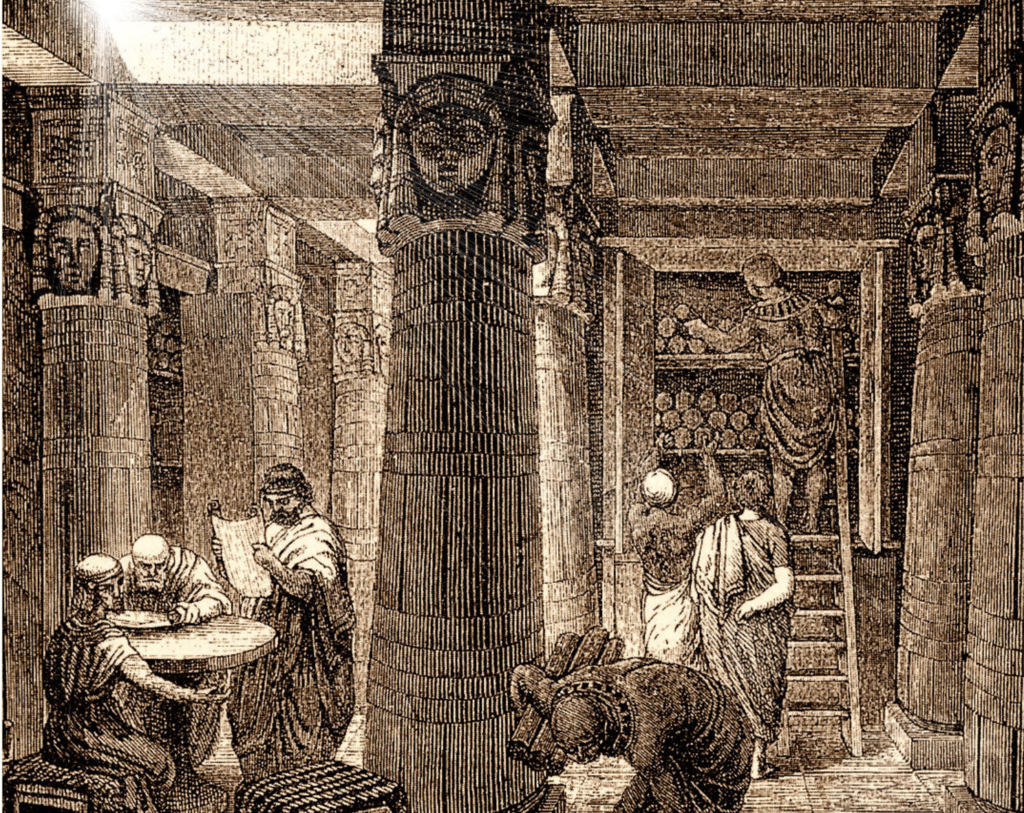The Library of Alexandria: A Beacon of Ancient Knowledge

Library of Alexandria – Photo Source: Wikimedia Commons
By: Rania Basria / Arab America Contributing Writer
The Library of Alexandria, one of the most renowned cultural institutions of the ancient world, represents humanity’s quest for knowledge and enlightenment. Located in Alexandria, Egypt, the library flourished during the Hellenistic period, serving as a hub for scholars, philosophers, and scientists. Its eventual annihilation was a devastating blow to global intellectual legacy, cloaked in mystery and sorrow.Arab America contributing writer, Rania Basria, looks at the Library’s origins, contributions, and eventual dissolution.
Founding of the Library
The Library of Alexandria was conceived during the time of Pharaoh Ptolemy I Soter (367-283 BCE), Alexander the Great’s general. Following Alexander’s death, Ptolemy created the Ptolemaic dynasty in Egypt, with the goal of making Alexandria a cultural and educational hub. His aim for a vast library was accomplished by his successor, Ptolemy II Philadelphus (283-246 BCE), who expanded the effort and appointed experts to oversee its development.
The Library was part of the Mouseion, a larger structure dedicated to the Muses, Greek mythology’s goddesses of art and science. This intellectual refuge contained lecture halls, research facilities, and gardens, creating a setting conducive to idea exchange and collaboration among experts.
Collection and Scope
The Library of Alexandria was unique in its desire to collect all of the world’s information. It is thought that the library included hundreds of thousands of scrolls from Egypt, Greece, India, Mesopotamia, and other regions. Text acquisition was a deliberate effort: ambassadors were sent across the Mediterranean to buy or copy manuscripts, and any books brought into the city by travelers were temporarily taken to generate duplicates for the library’s collection.
According to some reports, the library’s collection contained volumes in literature, philosophy, mathematics, astronomy, medicine, and engineering. It preserved the works of great thinkers like Homer, Socrates, Plato, and Aristotle, as well as lesser-known but as important contributors to human knowledge.
The Library’s Decline
Despite its splendor, the Library of Alexandria has experienced problems throughout the centuries. Accounts of its demolition vary and are sometimes embellished with historical and literary materials. The first known damage probably happened in 48 BCE, during Julius Caesar’s siege of Alexandria. While Caesar’s men were capturing the city, fires spread to the docks, probably destroying some of the library’s holdings.
Later, in the third century CE, the Roman Empire’s political unrest and the advent of Christianity contributed to Alexandria’s demise as a center of education. By the fourth century, religious and ideological disagreements may have resulted in the deliberate destruction of extant manuscripts, as pagan knowledge became increasingly perceived as incompatible with Christian teaching. Finally, when Arab forces took Alexandria in 642 CE, some historical chronicles suggest that the library’s ruins were destroyed, however historians disagree on this point.
The Legacy of the Library
The loss of the Library of Alexandria serves as a heartbreaking reminder of the fragility of knowledge and the need of its preservation. Although much of its content has been lost to history, the library’s legacy lives on through its aim of universal knowledge and effect on successor institutions, like as Pergamon’s libraries and later medieval Islamic libraries that saved classical works.
Today, the Bibliotheca Alexandrina in Alexandria serves as a modern tribute to the old library. It opened in 2002 as a cultural center, research institution, and public library, representing humanity’s ongoing pursuit for enlightenment.
The Library of Alexandria exemplified the Hellenistic world’s intellectual ambitions by gathering and spreading knowledge on a massive scale. Its history, from its founding by the Ptolemies to its enigmatic destruction, demonstrates the necessity of protecting human achievements from the ravages of time and conflict. While its destruction represented a watershed moment in history, its spirit continues to motivate efforts to conserve and spread knowledge in the modern era.








